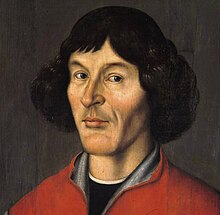
Back Nicolaas Copernicus Afrikaans Nicolaus Copernicus ALS ኒኮላውስ ኮፐርኒኩስ Amharic Nicolau Copernico AN نيكولاس كوبرنيكوس Arabic نيكولاوس كوبرنيكوس ARZ নিক'লাচ ক'পাৰ্নিকাচ Assamese Colás Copérnicu AST Mikołaj Kopernik AVK निकोलस कोपरनिकस AWA
Nicolaus Copernicus | |
|---|---|
 "Toruń portrait" (c. 1580)[a] | |
| Born | 19 February 1473 Toruń, Royal Prussia, Poland |
| Died | 24 May 1543 (aged 70) Frombork, Royal Prussia, Poland |
| Education |
|
| Known for | |
| Scientific career | |
| Fields |
|
| Academic advisors | Domenico Maria Novara da Ferrara |
| Signature | |
| Part of a series on |
| Physical cosmology |
|---|
Nicolaus Copernicus[b] (19 February 1473 – 24 May 1543) was a Renaissance polymath, active as a mathematician, astronomer, and Catholic canon, who formulated a model of the universe that placed the Sun rather than Earth at its center. In all likelihood, Copernicus developed his model independently of Aristarchus of Samos, an ancient Greek astronomer who had formulated such a model some eighteen centuries earlier.[6][c][d][e]
The publication of Copernicus's model in his book De revolutionibus orbium coelestium (On the Revolutions of the Celestial Spheres), just before his death in 1543, was a major event in the history of science, triggering the Copernican Revolution and making a pioneering contribution to the Scientific Revolution.[8]
Copernicus was born and died in Royal Prussia, a semiautonomous and multilingual region that had been part of the Kingdom of Poland since 1466. A polyglot and polymath, he obtained a doctorate in canon law and was a mathematician, astronomer, physician, classics scholar, translator, governor, diplomat, and economist. From 1497 he was a Warmian Cathedral chapter canon. In 1517 he derived a quantity theory of money—a key concept in economics—and in 1519 he formulated an economic principle that later came to be called Gresham's law.[f]
- ^ André Goddu, Copernicus and the Aristotelian Tradition (2010), p. 436 (note 125), citing Goddu, review of Jerzy Gassowski, "Poszukiwanie grobu Mikołaja Kopernika" ("Search for Grave of Nicolaus Copernicus"), in Journal for the History of Astronomy, 38.2 (May 2007), p. 255.
- ^ Jones, Daniel (2003) [1917], Roach, Peter; Hartmann, James; Setter, Jane (eds.), English Pronouncing Dictionary, Cambridge: Cambridge University Press, ISBN 978-3-12-539683-8
- ^ "Copernicus". Dictionary.com Unabridged (Online). n.d.
- ^ "Copernicus". Merriam-Webster.com Dictionary.
- ^ Stanisław Borawski "Mikołaj Kopernik (Nicolaus Copernicus)"
- ^ Linton 2004, pp. 39, 119.
- ^ a b Owen Gingerich, "Did Copernicus Owe a Debt to Aristarchus?", Journal for the History of Astronomy, vol. 16, no. 1 (February 1985), pp. 37–42. "There is no question but that Aristarchus had the priority of the heliocentric idea. Yet there is no evidence that Copernicus owed him anything.(!9) As far as we can tell both the idea and its justification were found independently by Copernicus."
- ^ Edward Rosen, "Copernicus, Nicolaus", Encyclopedia Americana, International Edition, volume 7, Danbury, Connecticut, Grolier Incorporated, 1986, ISBN 0-7172-0117-1, pp. 755–56.
- ^ Angus Armitage, The World of Copernicus, 1951, p. 91.
Cite error: There are <ref group=lower-alpha> tags or {{efn}} templates on this page, but the references will not show without a {{reflist|group=lower-alpha}} template or {{notelist}} template (see the help page).
© MMXXIII Rich X Search. We shall prevail. All rights reserved. Rich X Search